Singaporeans’ eating habits explained: We’re fine with expired food and ignore nutrition labels
An online survey commissioned by Etiqa to assess Singaporeans' nutrition literacy found that while we may know what is nutritionally healthy, we may not necessarily put what we know into practice.

Although 76 per cent of the 1,000 respondents in the nutrition literacy survey are diet-conscious during the pandemic, only 54 per cent think that they are eating healthily most of the time. (Photo: iStock/AsiaVision)
How well do you eat? No, we don’t mean how often you indulge in bubble tea, wagyu hotpot or the island’s most expensive nasi lemak – but rather, the quality of the nutrients you get from your food.
For all the access Singaporeans have to affordable hawker fare and world-class restaurants as well as our reputation as foodies (and might we add, three seasons of MasterChef Singapore that demonstrated Singaporeans can cook), we should be eating very well, right? Or at least know what to eat to be healthy, yes?
Maybe not. An online survey in May 2022 to assess Singaporeans’ nutrition literacy showed that although 76 per cent of the 1,000 respondents were diet-conscious during the pandemic, only 54 per cent thought that they were eating healthily most of the time.
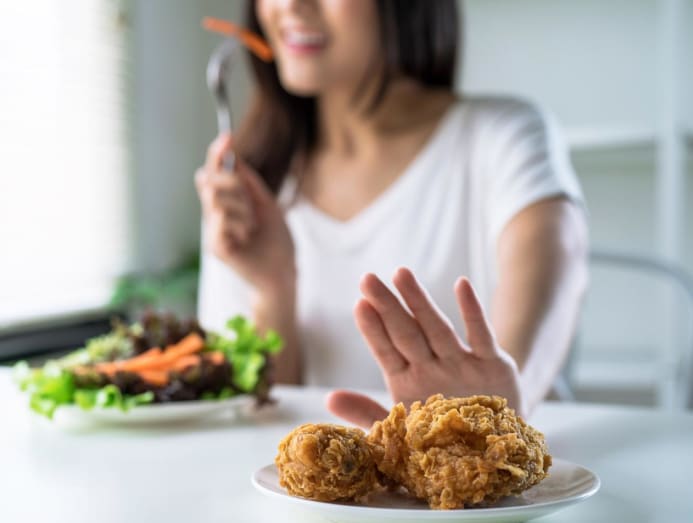
“Based on my experience working with people to improve their health, a good 50 per cent of Singaporeans understand nutrition fundamentals, but the other 50 per cent have very minimal understanding of what food groups are and their functions for our body,” said Fiona Chia, the managing director of nutrition consultancy firm Health Can Be Fun.
Just how did Singaporeans fare in this nutrition literacy survey commissioned by Etiqa, which involved individuals between the ages of 18 and 64? We find out.
YOU KNOW WHAT THE BAD STUFF ARE BUT YOU AREN’T REALLY AVOIDING THEM
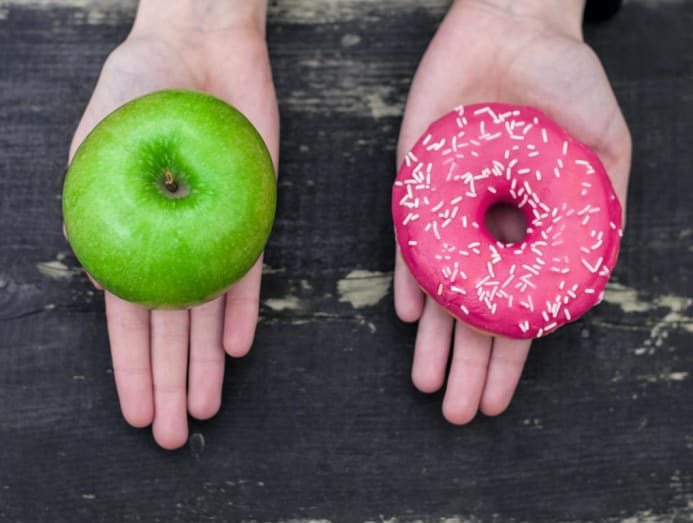
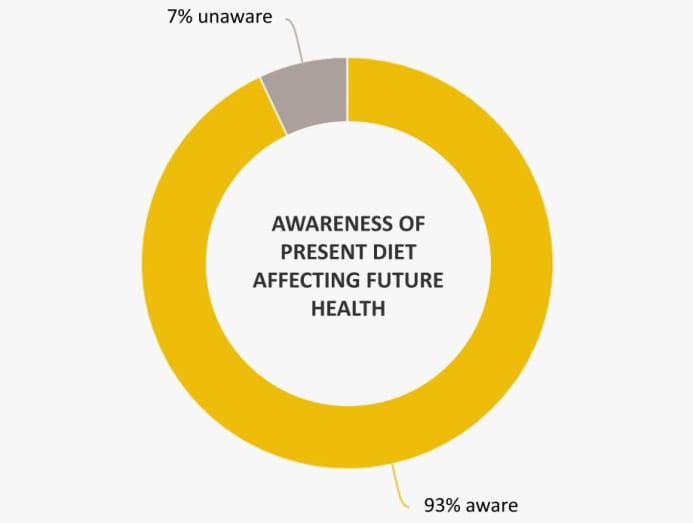
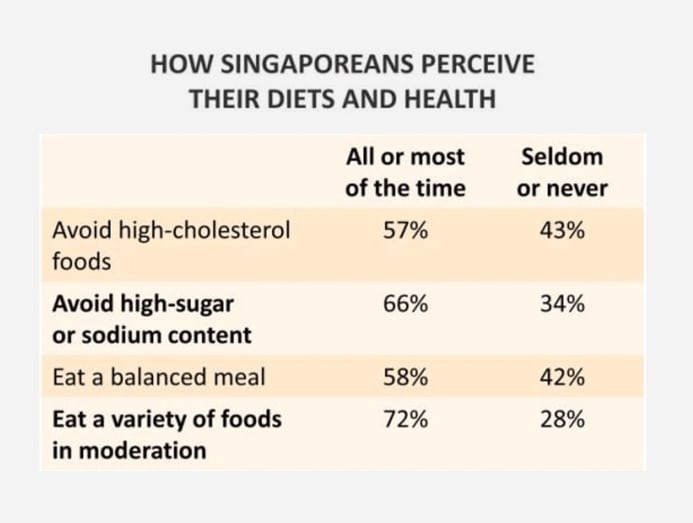
While majority of Singaporeans might be aware that what they eat now could affect their health in the future (93 per cent), they weren’t quite taking the right action, according to the nutrition survey. Take, for instance, high-cholesterol foods: 43 per cent seldom or never avoided them; 34 per cent did the same for foods that are high in sugar or sodium.
Etiqa’s chief marketing officer Shirley Tan, who has a Masters in Gerontology and an interest in nutrition, had a few theories on why we just aren’t walking the talk. “There is the perception that healthier food has to fit certain criteria. For example, it has to be organic and this is only available at higher prices,” she said.
Cost aside, poor eating habits that have been cultivated from young could be hard to kick. For example, fast food or dessert is often used as a reward for children, she said.
While our hawker culture has provided us with affordable and delicious food, they “usually are high in salt and oil and hence, are very unhealthy when eaten regularly”, said Tan.
And there are those who “prefer to live in the moment and enjoy what they want to eat now rather than think about the long-term effects of their dietary habits, often known as the You Only Live Once syndrome (YOLO)”, said Tan.
THE OLDER YOU ARE, THE HEALTHIER YOU SNACK

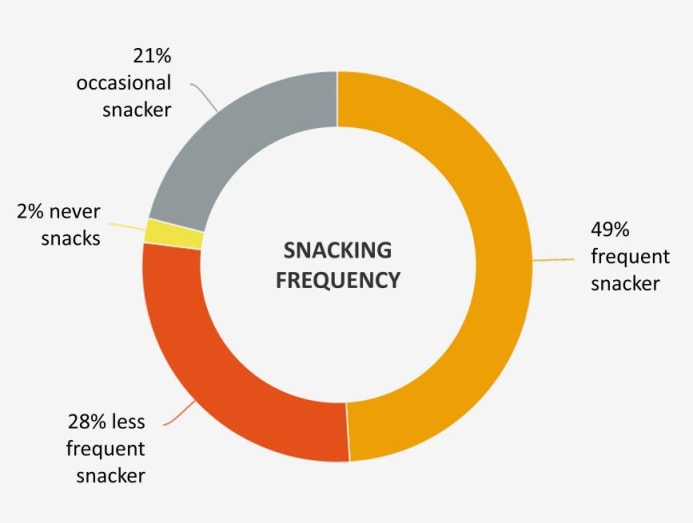
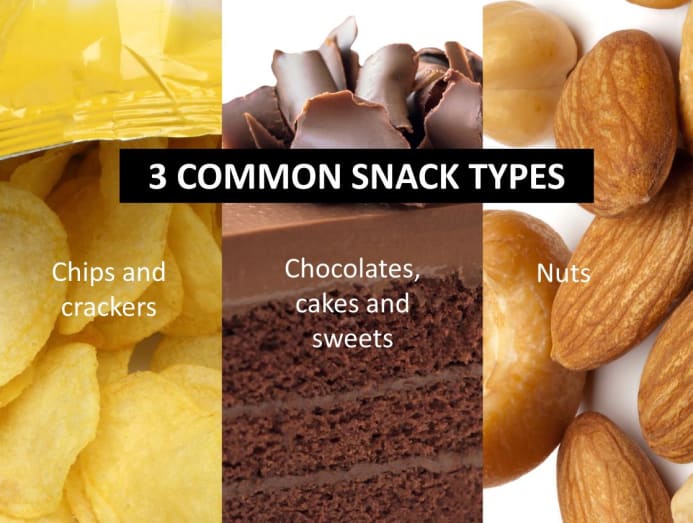
It’s no surprise that almost everyone snacks (98 per cent). The differentiation is in how often you snack. As it turned out, one in two were frequent snackers, who munched three times or more a week. Almost one third (28 per cent) snacked once or twice a week, while a fifth (21 per cent) did so less than once a week, according to the survey.
The three most common snack types were: Chips and crackers (59 per cent); chocolates, cakes and sweets (51 per cent); and nuts (45 per cent).
Also, the younger the respondents, the less healthy their snack choices, according to the survey: 80 per cent of those between 18 and 24 years old admitted they snacked on unhealthy snacks (low nutritional values but high in fat, sugar and calories) compared to 37 per cent of those aged 55 and over.
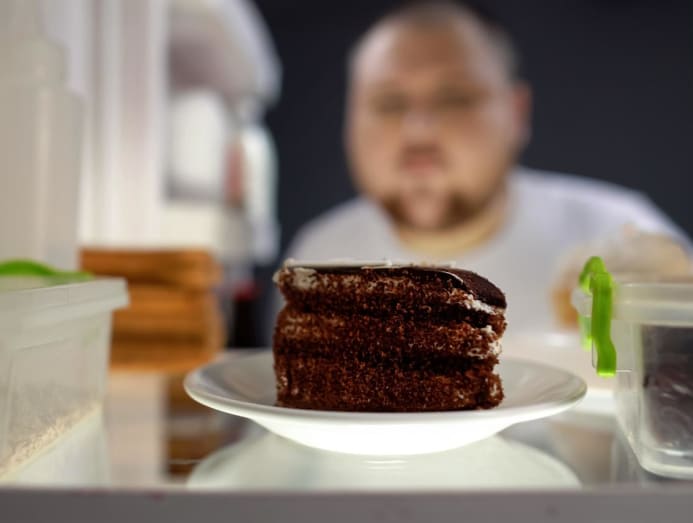
The older group would probably have undergone health screenings and received some health scares along the way, said Chia. “They also are more aware of old-age chronic health issues; hence, they would generally be more health-conscious and know that excessive and unhealthy snacking does not benefit them.”
Furthermore, your digestion deteriorates with age, which makes your gastrointestinal system less capable of handling certain snacks, said Chia.
“Our digestion tends to slow down as our gastrointestinal tract loses its elasticity and function with age. Hence, oily, deep-fried, high-sodium and high-sugar foods may cause issues such as bloating, cramps and changes in bowel movement.”
OLDER SHOPPERS AREN’T READING THE NUTRITION INFORMATION AS MUCH AS YOUNGER ONES

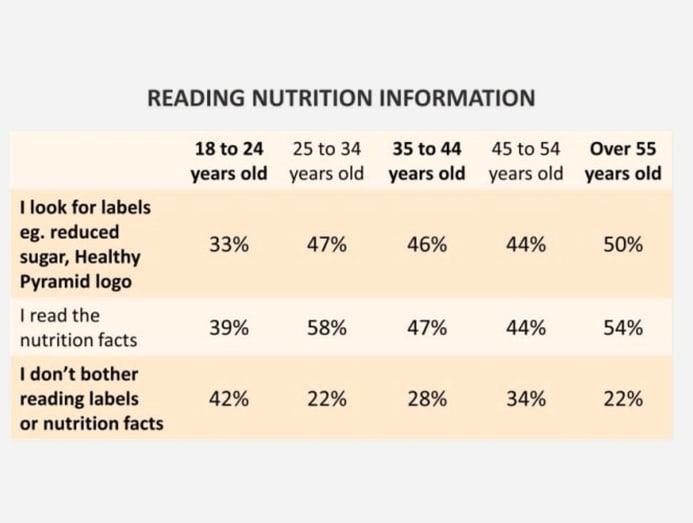
When grocery shopping, close to half of the respondents will read either the health labels or the nutrition facts – but 30 per cent will ignore all the information. And in the latter group that doesn’t read, 42 per cent of them are Gen Z or those between the ages of 18 and 24.
Interestingly, slightly more younger respondents (25- to 34-year-olds) study the packaging of their food compared to those above the age of 45. It could be due to the increase in health and fitness enthusiasts in this group, said Tan, and they might pay more attention to the food they consume.
As for why fewer older adults pay attention to the nutrition information, it could be an issue of poor eyesight, she said. Nutrition facts are often in fine print, which makes it difficult for those with bad eyesight to decipher.
Furthermore, reading the nutrition label can be challenging if we do not know what we need to look out for, said Chia. “Learning about food groups and their sources helps us to zoom in on key benefits that we derive from food.

“For example, in carbohydrate-rich foods, we should be looking out for dietary fibre,” she said. “In oils, we should be looking for lower saturated fat and higher mono or polyunsaturated fat content. For snacks, we should be looking out for sodium and total sugar level.”
If bad eyesight is thwarting your efforts to shop healthier, look for the more obvious health labels. For instance, a food with “lower sugar” or “reduced sodium” label is generally 25 per cent lower in sugar or sodium than its conventional counterpart, said Chia.
To be even savvier when comparing food, Chia suggested looking at the canning medium used: For example, canned sardines with a “reduced sodium” health label is a good pick. However, canned sardines in water that do not have a reduced sodium claim, may be even healthier than canned sardines in oil or tomato sauce.
YOU ARE LIKELY TO EAT EXPIRED CANNED FOOD
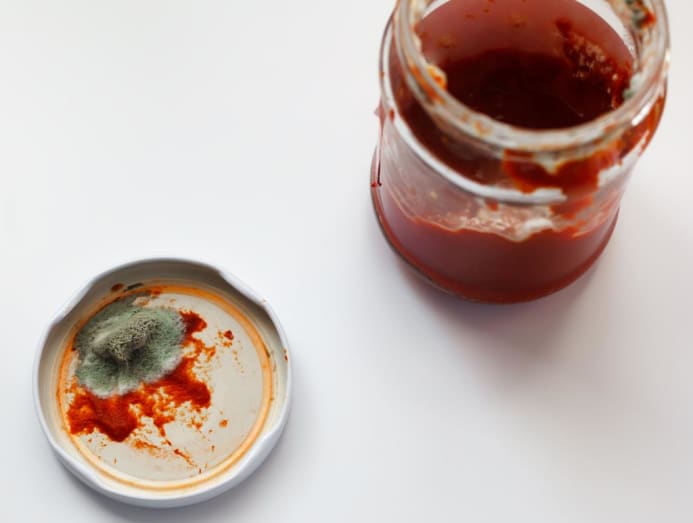
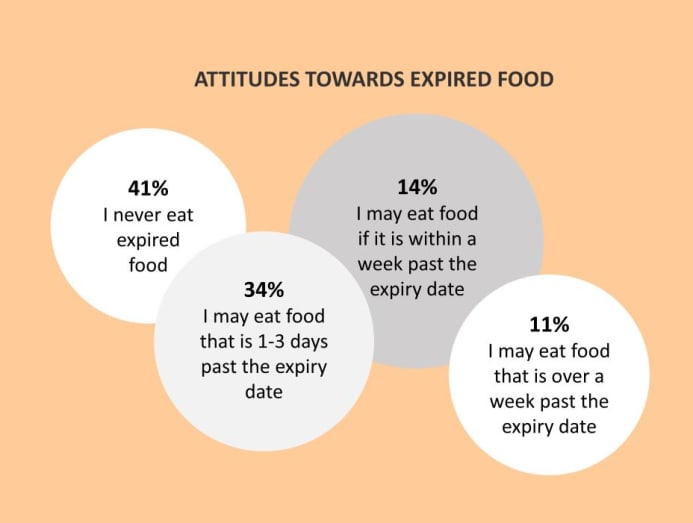
The survey found that more than half of Singaporeans (59 per cent) are willing to eat expired packed or canned food. Out of this lot, 34 per cent may do so if the food is one to three days past the expiry date, while 14 per cent will still eat the food if it is one week past. And 11 per cent may eat food that is over a week past.
According to Tan, there are a few reasons why Singaporeans may continue to consume food past the expiry date. One, they may be unaware of the health implications of consuming expired food.
“Few are aware of the health implications of consuming expired food," said Tan. "As warned by health professionals, eating expired canned food brings infection risks from Clostridium botulinum, which are temperature-resistant bacteria that can cause paralysis and death."
Two, added Tan, they may base their judgement on the external appearance of the packaging or can, which may not be accurate indications.
Thirdly, consumers may “not know the difference between ‘expired’ versus ‘best before’ and ‘use by’ dates”, said Chia. “Food that is past its expiry date should not be consumed at all.”








